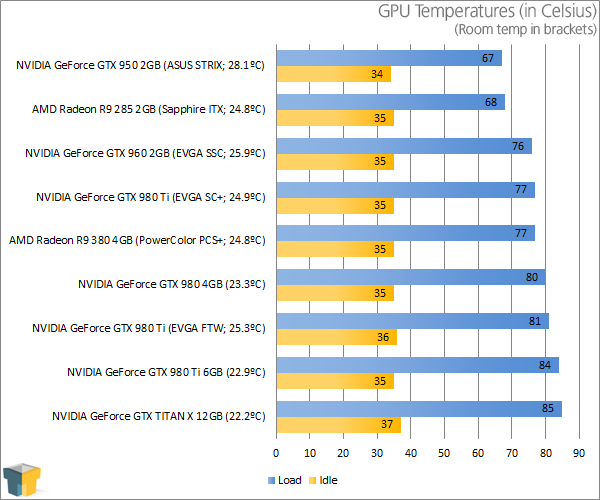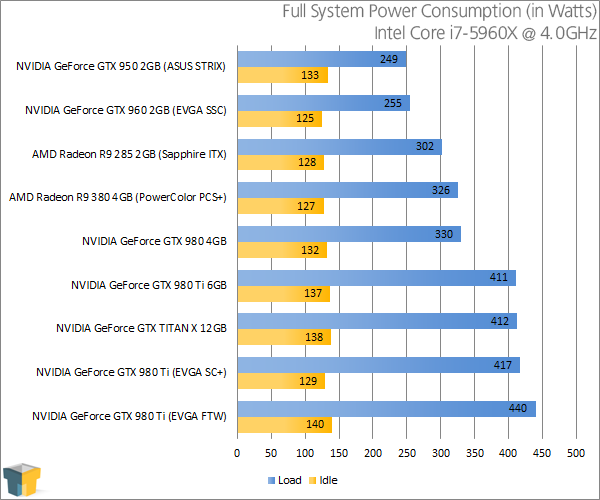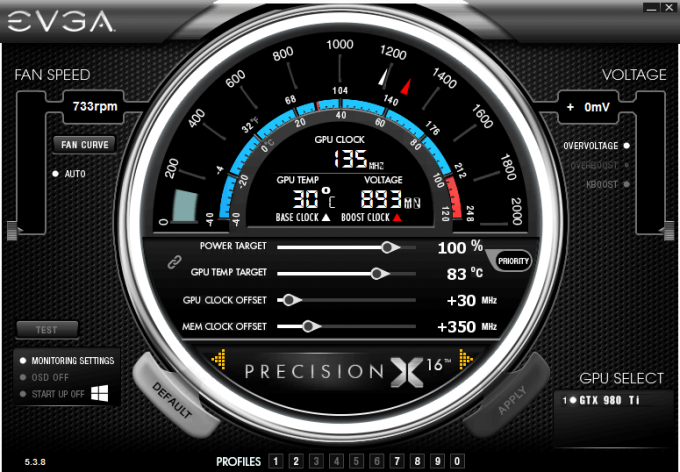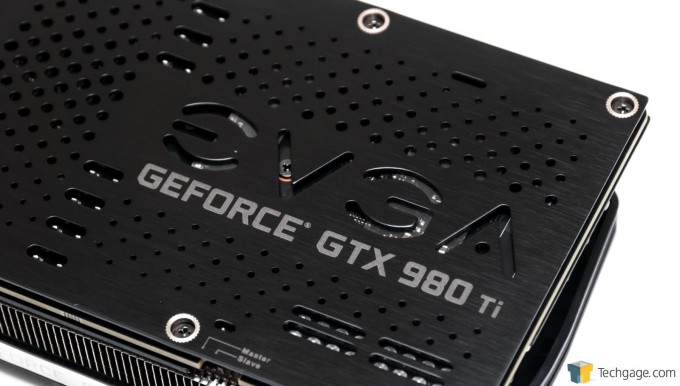- Qualcomm Launches Snapdragon 4 Gen 2 Mobile Platform
- AMD Launches Ryzen PRO 7000 Series Mobile & Desktop Platform
- Intel Launches Sleek Single-Slot Arc Pro A60 Workstation Graphics Card
- NVIDIA Announces Latest Ada Lovelace Additions: GeForce RTX 4060 Ti & RTX 4060
- Maxon Redshift With AMD Radeon GPU Rendering Support Now Available
EVGA GeForce GTX 980 Ti FTW Graphics Card Review

NVIDIA’s GeForce 980 Ti is a seriously compelling high-end graphics card, so it’s not too hard for vendors to make their offerings tempting. With its FTW edition, though, EVGA does have one trick up its sleeve: a bumping of the reference clock speed to 119%. There’s more than just that to the card, though, so let’s dive right in.
Page 9 – Power & Temperatures, Overclocking & Final Thoughts
To test graphics cards for both their power consumption and temperature at load, we utilize a couple of different tools. On the hardware side, we use a trusty Kill-a-Watt power monitor which our GPU test machine plugs into directly. For software, we use Futuremark’s 3DMark to stress the card, and GPU-Z to record the temperatures.
To test, the area around the chassis is checked with a temperature gun, with the average temp recorded. Once that’s established, the PC is turned on and left to sit idle for five minutes. At this point, we open GPU-Z along with 3DMark. We then kick-off a full suite run, and pay attention to the Kill-a-Watt when the test reaches its most intensive interval (Fire Strike GT 1) to get the peak wattage.


Despite the far improved clocks on EVGA’s 980 Ti FTW card (over reference), it still manages to run 3°C cooler at load. At the same time, the card draws 29W more out of the power socket, which isn’t too much of a surprise given the performance boost.
Overclocking & Final Thoughts
When I first popped this FTW card into our testing PC, I expected some impressive things overclocking-wise. In hindsight, I’m not sure why. While the card one-ups the Superclocked+ by replacing a 6-pin with an 8-pin, allowing for an additional 25W of power, the fact of the matter is, this card is already clocked 19% higher than stock, and likewise, 88MHz higher than the SC+ edition.
While it might be possible to still achieve a great overclock on this card, I wasn’t able to – and believe me, I spent a lot of time on it (more than I’d like to admit.) I tried increasing the voltage, power and temperature targets, core clock, and memory clock all at once, and one-by-one, in conjunction with topped-out fan speeds. Temperatures were not the issue, as I purposely cranked the fan to never surpass 70°C. No matter what I did, I could not get what I felt was an overclock worthy of retesting our benchmarks with.
When all said and done, I achieved +30MHz on the core, and +350MHz on the memory.
I would like to point something out, though. To some, +50MHz might have been deemed stable, and in fact, 3DMark’s Fire Strike led me to believe that it was (even at 4K). However, an even better test of a stable overclock is the Sky Diver test. As I’ve discovered over the past few reviews, even if Fire Strike deems an overclock stable, Sky Diver might not. And in experience, that’s lined up with what I’ve seen in gaming (eg: if Sky Diver crashes, then so too will most games after about 10 minutes.)
Nonetheless, there’s nothing to discredit here since I did manage a boost beyond what’s already a really high clock. At 1,220MHz, this overclock is 22% higher than reference. While memory also saw a nice boost, it hasn’t revealed itself to me too well in benchmarks. If anyone out there picks up this card, I’d be interested in hearing about your overclocking experience.
While overclocking this particular model wasn’t as fun as it was with the reference 980 Ti, or even EVGA’s Superclocked+, it brings a lot to the table. It’s super-fast right out of the box, runs quiet and cool, and as of the time of writing, includes one of two AAA titles due out soon.
A nice perk right now is that the card also happens to cost the exact same as SRP at both Amazon and Newegg, although it should be noted that Amazon makes no mention of the Bullets or Blades promotion.
Those looking for an “ultimate” 980 Ti that are not looking for hardcore overclocking would do well to check out EVGA’s 980 Ti FTW. Seriously – I can’t find a real downside here. If you’re willing to pony up the cost of such a high-end card, you’ll be treated to a great one here.
Pros
- Carries slight premium over SRP, but delivers far more performance.
(As mentioned in the review, the card is currently available at the $649 SRP.) - ~40% faster than the GTX 980; more powerful than TITAN X.
- 6GB framebuffer offers far improved future-proofing than GTX 980.
- A massive upgrade for those wanting to upgrade from a top-end 600 card.
- Power-efficient (~440W at load with an overclocked i7-5960X).
- Modest overclock manages to match the overclocked performance of our TITAN X (~4,800 in 3DMark Fire Strike 4K).
Cons
- Given the super-high clocks of the card, overclocking didn’t offer too much fun.

EVGA GeForce GTX 980 Ti FTW
Support our efforts! With ad revenue at an all-time low for written websites, we're relying more than ever on reader support to help us continue putting so much effort into this type of content. You can support us by becoming a Patron, or by using our Amazon shopping affiliate links listed through our articles. Thanks for your support!







